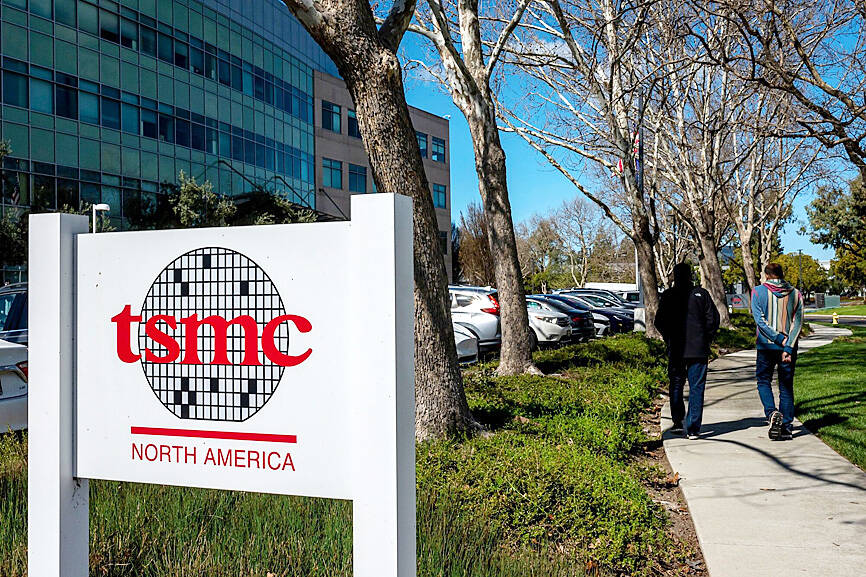Taiwan Semiconductor Manufacturing Co (TSMC, 台積電) retained its top position in the global wafer foundry business in the fourth quarter of last year and widened its lead over second-placed Samsung Electronics Co, TrendForce Corp (集邦科技) said in a report on Monday.
TSMC posted US$26.85 billion in sales in the October-to-December period, up 14.1 percent from the previous quarter, which lifted its market share to 67.1 percent, up from 64.7 percent in the prior quarter, the Taipei-based market researcher said.
In contrast, Samsung’s sales fell 1.4 percent sequentially to US$3.26 billion last quarter and its market share slid to 8.1 percent from 9.1 percent over the period, the report said.

Photo: Bloomberg
That widened the gap between the two companies to 59 percentage points last quarter from 55.6 percentage points a quarter earlier.
TrendForce attributed TSMC’s growth to persistent demand for artificial intelligence (AI)-related chips and advanced packaging services, in addition to steady orders for chips used in high-end smartphones and new PC platforms.
Meanwhile, Samsung’s revenue fell as order gains from new clients for advanced-node chips did not fully offset declines in orders from major existing clients due to rising competition in mature nodes from Chinese rivals, the report said.
China’s Semiconductor Manufacturing International Corp (中芯) came in third with US$2.21 billion in revenue last quarter and a market share of 5.5 percent, narrowing its gap with Samsung to 2.6 percentage points from 3.1 percentage points in the previous quarter, the report said.
United Microelectronics Corp (聯電) ranked fourth with US$1.87 billion in revenue and a 4.7 percent market share, ahead of US-based GlobalFoundries Inc with US$1.83 billion in revenue and a 4.6 percent market share, the report showed.
In sixth to 10th places were China’s Huahong Group (華虹) with US$1.04 billion in revenue and a 2.6 percent market share; Israel’s Tower Semiconductor Ltd with US$387 million and 1 percent market share; Vanguard International Semiconductor Corp (世界先進) with US$357 million and 0.9 percent; China’s NexChip Co (晶合集成) with US$344 million and 0.9 percent; and Powerchip Semiconductor Manufacturing Corp (力積電) with US$333 million and 0.8 percent, the report added.
The combined revenue of the top 10 wafer foundry companies reached a fresh record high of US$38.48 billion last quarter, up 9.9 percent from US$35.01 billion in the previous quarter, as strong demand for advanced-node chips for AI servers, flagship smartphone application processors and new PC platforms helped offset the slowdown in demand for mature-node chips, TrendForce said.
As the industry’s momentum remains largely unchanged, overall foundry revenue this quarter is forecast to decline slightly from last quarter, despite the beginning of a year being a seasonally weak quarter for foundries, TrendForce added.

South Korea’s equity benchmark yesterday crossed a new milestone just a month after surpassing the once-unthinkable 5,000 mark as surging global memory demand powers the country’s biggest chipmakers. The KOSPI advanced as much as 2.6 percent to a record 6,123, with Samsung Electronics Co and SK Hynix Inc each gaining more than 2 percent. With the benchmark now up 45 percent this year, South Korea’s stock market capitalization has also moved past France’s, following last month’s overtaking of Germany’s. Long overlooked by foreign funds, despite being undervalued, South Korean stocks have now emerged as clear winners in the global market. The so-called “artificial intelligence

NEW IDENTITY: Known for its software, India has expanded into hardware, with its semiconductor industry growing from US$38bn in 2023 to US$45bn to US$50bn India on Saturday inaugurated its first semiconductor assembly and test facility, a milestone in the government’s push to reduce dependence on foreign chipmakers and stake a claim in a sector dominated by China. Indian Prime Minister Narendra Modi opened US firm Micron Technology Inc’s semiconductor assembly, test and packaging unit in his home state of Gujarat, hailing the “dawn of a new era” for India’s technology ambitions. “When young Indians look back in the future, they will see this decade as the turning point in our tech future,” Modi told the event, which was broadcast on his YouTube channel. The plant would convert

‘SEISMIC SHIFT’: The researcher forecast there would be about 1.1 billion mobile shipments this year, down from 1.26 billion the prior year and erasing years of gains The global smartphone market is expected to contract 12.9 percent this year due to the unprecedented memorychip shortage, marking “a crisis like no other,” researcher International Data Corp (IDC) said. The new forecast, a dramatic revision down from earlier estimates, gives the latest accounting of the ongoing memory crunch that is affecting every corner of the electronics industry. The demand for advanced memory to power artificial intelligence (AI) tasks has drained global supply until well into next year and jeopardizes the business model of many smartphone makers. IDC forecast about 1.1 billion mobile shipments this year, down from 1.26 billion the prior

People stand in a Pokemon store in Tokyo on Thursday. One of the world highest-grossing franchises is celebrated its 30th anniversary yesterday.